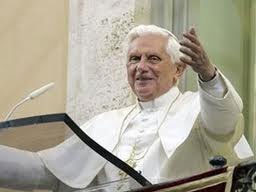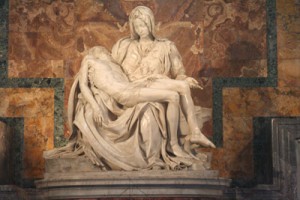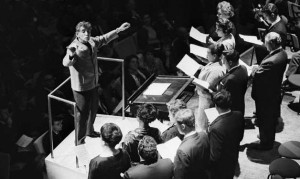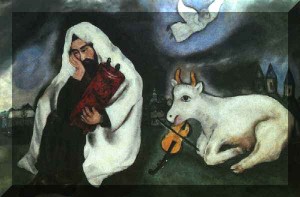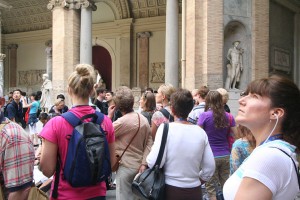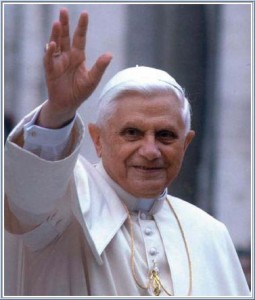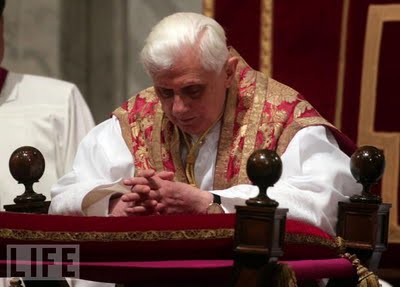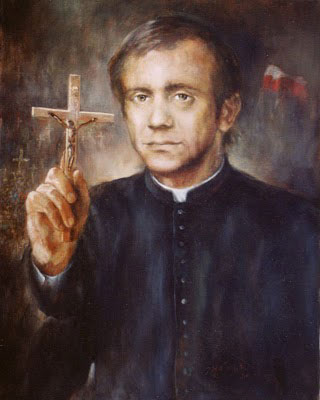 From Pope Benedict XVI, an excerpt
From Pope Benedict XVI, an excerpt
Another figure I wish to remember: Fr Jerzy Popiełuszko, a priest and martyr who was proclaimed Blessed in Warsaw precisely last Sunday. He exercised his generous and courageous ministry beside all those who were working for freedom, for the defence of life and for its dignity. His work at the service of goodness and truth was a sign of contradiction for the regime governing Poland at the time. Love of the Heart of Christ led him to give his life and his witness was the seed of a new springtime in the Church and in society. If we look at history, we can note how many pages of authentic spiritual and social renewal were written with the crucial contribution of Catholic priests, motivated solely by passion for the Gospel and for human beings and for their true freedom, both religious and civil. How many initiatives of integral human promotion have been born from the intuition of a priestly heart!
Dear brothers and sisters, let us entrust all the priests in the world to the Immaculate Heart of Mary, whose liturgical Memorial we celebrated yesterday, so that they may continue with the power of the Gospel to build everywhere the civilization of love.
Tags: Blessed Jerzy Popieluszko, catholic, catholic podcast, catholic prayer, cathollc spirituality, martyr, martyrdom, pope benedict xvi
This entry was posted on Wednesday, October 19th, 2011 at 7:47 am
You can follow any responses to this entry through the RSS 2.0 feed.
HUMAN HISTORY IS A HISTORY OF SALVATION – Psalm 126
VATICAN CITY, OCT. 12, 2011 (Zenit.org).- Here is a translation of the Italian-language catechesis Benedict XVI gave today during the general audience held in St. Peter’s Square. The Pope today continued his catecheses on prayer with a reflection on Psalm 126.
* * *
In the previous catecheses, we have meditated on a number of psalms of lament and of trust. Today, I would like to reflect with you on a notably joyous psalm, a prayer that sings with joy the marvels of God. It is Psalm 126 — according to Greco-Latin numbering, 125 — which extols the great things the Lord has done with His people, and which He continues to do with every believer.
The psalmist begins the prayer in the name of all Israel by recalling the thrilling experience of salvation:
“When the Lord restored the fortunes of Zion,
we were like those who dream.
Then our mouth was filled with laughter,
and our tongue with shouts of joy” (Verses 1-2a).
The psalm speaks of “restored fortunes”; that is, restored to their original state in all their former favorability. It begins then with a situation of suffering and of need to which God responds by bringing about salvation and restoring the man who prays to his former condition; indeed, one that is enriched and even changed for the better. This is what happens to Job, when the Lord restores to him all that he had lost, redoubling it and bestowing upon him an even greater blessing (cf. Job 42:10-13), and this is what the people of Israel experience in returning to their homeland after the Babylonian exile.
This psalm is meant to be interpreted with reference to the end of the deportation to a foreign land: The expression “restore the fortunes of Zion” is read and understood by the tradition as a “return of the prisoners of Zion.” In fact, the return from exile is paradigmatic of every divine and saving intervention, since the fall of Jerusalem and the deportation into Babylon were devastating experiences for the Chosen People, not only on the political and social planes, but also and especially on the religious and spiritual ones. The loss of their land, the end of the davidic monarchy and the destruction of the Temple appear as a denial of the divine promises, and the People of the Covenant, dispersed among the pagans, painfully question a God who seems to have abandoned them.
Therefore, the end of the deportation and their return to their homeland are experienced as a marvelous return to faith, to trust, to communion with the Lord; it is a “restoring of fortunes” that involves a conversion of heart, forgiveness, re-found friendship with God, knowledge of His mercy and a renewed possibility of praising Him (cf. Jeremiah 29:12-14; 30:18-20; 33:6-11; Ezekiel 39:25-29). It is an experience of overflowing joy, of laughter and of cries of jubilation, so beautiful that “it seems like a dream.” Divine help often takes surprising forms that surpass what man is able to imagine; hence the wonder and joy that are expressed in this psalm: “The Lord has done great things.” This is what the nations said, and it is what Israel proclaims:
“Then they said among the nations,
‘the Lord has done great things for them.’
The Lord has done great things for us;
we are glad” (Verses 2b-3).
God performs marvelous works in the history of men. In carrying out salvation, He reveals Himself
to all as the powerful and merciful Lord, a refuge for the oppressed, who does not forget the cry of the poor (cf. Psalm 9:10,13), who loves justice and right and of whose love the earth is filled (cf. Psalm 33:5). Thus, standing before the liberation of the People of Israel, all the nations recognize the great and marvelous things God has accomplished for His People, and they celebrate the Lord in His reality as Savior.
And Israel echoes the proclamation of the nations, taking it up and repeating it once more — but as the protagonist — as a direct recipient of the divine action: “The Lord has done great things for us”; “for us” or even more precisely, “with us,” in hebrew ‘immanû, thus affirming that privileged relationship that the Lord keeps with His chosen ones, and which is found in the nameEmmanuel, “God with us,” the name by which Jesus would be called, His complete and full revelation (cf. Matthew 1:23).
Dear brothers and sisters, in our prayer we should look more often at how, in the events of our own lives, the Lord has protected, guided and helped us, and we should praise Him for all He has done and does for us. We should be more attentive to the good things the Lord gives to us. We are always attentive to problems and to difficulties, and we are almost unwilling to perceive that there are beautiful things that come from the Lord. This attention, which becomes gratitude, is very important for us; it creates in us a memory for the good and it helps us also in times of darkness. God accomplishes great things, and whoever experiences this — attentive to the Lord’s goodness with an attentiveness of heart — is filled with joy. The first part of the psalm concludes on this joyous note. To be saved and to return to one’s homeland from exile are like being returned to life: Freedom opens up to laughter, but is does so together with a waiting for a fulfillment still desired and implored. This is the second part of our psalm, which continues: (more…)
Tags: catholic, catholic podcast, catholic prayer, cathollc spirituality, pope benedict xvi, prayer, psalm 126
This entry was posted on Wednesday, October 12th, 2011 at 5:48 pm
You can follow any responses to this entry through the RSS 2.0 feed.
VATICAN CITY, 6 APR 2011 (VIS) – In his general audience in St. Peter’s Square today, attended by more than 10,000 people, Benedict XVI dedicated his catechesis to St. Therese of Lisieux, or St. Therese of the Child Jesus and the Holy Face, “who lived in this world for only twenty-four years at the end of the nineteenth century, leading a very simple and hidden life, but who, after her death and the publication of her writings, became one of the best-known and loved saints”.
“Little Therese“, the Pope continued, “never failed to help the most simple souls, the little ones, the poor and the suffering who prayed to her, but also illuminated all the Church with her profound spiritual doctrine, to the point that the Venerable John Paul II, in 1997, granted her the title of Doctor of the Church … and described her as an ‘expert in scientia amoris’. Therese expressed this science, in which all the truth of the faith is revealed in love, in her autobiography ‘The Story of a Soul’, published a year after her death”.
Therese was born in 1873 in Alencon, France. She was the youngest of the nine children of Louis and Zelie Martin, and was beatified in 2008. Her mother died when she was four years old, and Therese later suffered from a serious nervous disorder from which she recovered in 1886 thanks to what she later described as “the smile of the Virgin”. In 1887 she made a pilgrimage to Rome with her father and sister, where she asked Leo XIII for permission to enter Carmel of Lisieux, at just fifteen years of age. Her wish was granted a year later; however, at the same time her father began to suffer from a serious mental illness, which led Therese to the contemplation of the Holy Face of Christ in his Passion. In 1890 she took her vows. 1896 marked the beginning of a period of great  physical and spiritual suffering, which accompanied her until her death.
physical and spiritual suffering, which accompanied her until her death.
In those moments, “she lived the faith at its most heroic, as the light in the shadows that invade the soul” the Pope said. In this context of suffering, living the greatest love in the littlest things of daily life, the Saint realised her vocation of becoming the love at the heart of the Church”.
She died in the afternoon of 30 September, 1897, uttering the simple words, “My Lord, I love You!”. “These last words are the key to all her doctrine, to her interpretation of the Gospel”, the Pope emphasised. “The act of love, expressed in her final breath, was like the continued breathing of the soul … The words ‘Jesus, I love You’ are at the centre of all her writings”.
St. Therese is “one of the ‘little ones’ of the Gospel who allow themselves to be guided by God, in the depth of His mystery. A guide for all, especially for… theologians. With humility and faith, Therese continually entered the heart of the Scriptures which contain the Mystery of Christ. This reading of the Bible, enriched by the science of love, does not oppose academic science. The ‘science of the saints’, to which she refers on the final page of ‘The Story of a Soul’, is the highest form of science”.
“In the Gospel, Therese discovers above all the Mercy of Jesus … and ‘Trust and Love’ are therefore the end point of her account of her life, two words that, like beacons, illuminated her saintly path, in order to guide others along the same ‘little way of trust and love’, of spiritual childhood. Her trust is like that of a child, entrusting herself to the hands of God, and inseparable from her strong, radical commitment to the true love that is the full giving of oneself”, the Holy Father concluded.
More on St. Therese can be found here
Also click here for a Novena to St. Therese
Tags: catholic, catholic podcast, catholic prayer, cathollc spirituality, doctor of the church, little way, pope benedict xvi, st therese of lisieux, st therese of the child jesus, story of a soul, therese of the child jesus
This entry was posted on Saturday, October 1st, 2011 at 12:01 am
You can follow any responses to this entry through the RSS 2.0 feed.
No surprise to readers and listeners of Discerning Hearts (especially those who follow the teachings of Deacon James Keating)….”Silence is Golden”! Pope Benedict XVI has chosen “Silence and Word” as the theme for World Communication Day.
Deacon James Keating)….”Silence is Golden”! Pope Benedict XVI has chosen “Silence and Word” as the theme for World Communication Day.
Don’t you just love it…earlier we heard from Vatican Radio that the symposium of former theological students of the Holy Father that met with him this past summer reflected on what exactly is meant by the “new evangelizaation”. As reported it ultimately comes down to HUMILITY Â (click here to read and to listen to more on this report).
“Silence and Word” is the path to humility? It works for me!
From Vatican Radio:
[powerpress = Vatican-Radio]
The Pontifical Council for Social Communications on Thursday announced the theme for the 2012 World Communications Day:Â Silence and Word: path of evangelization. Below is the text of a communique from the Council explaining the theme in context:
Statement from the Pontifical Council for Social Communications on the theme for the 2012 World Communications Day
The extra-ordinarily varied nature of the contribution of modern communications to society highlights the need for a value which, on first consideration, might seem to stand in contradistinction to it.
Silence, in fact, is the central theme for the next World Communications Day Message: Silence and Word: path of evangelization. In the thought of Pope Benedict XVI, silence is not presented simply as an antidote to the constant and unstoppable flow of information that characterizes society today but rather as a factor that is necessary for its integration.
Silence, precisely because it favors habits of discernment and reflection, can in fact be seen primarily as a means of welcoming the word. We ought not to think in terms of a dualism, but of the complementary nature of two elements which when they are held in balance serve to enrich the value of communication and which make it a key factor that can serve the new evangelization.
It is clearly the desire of the Holy Father to associate the theme of the next World Communications Day with the celebration of the forthcoming Synod of Bishops which will have as its own theme: The New Evangelization for the Transmission of the Christian Faith.
World Communications Day, the only worldwide celebration called for by the Second Vatican Council (Inter Mirifica, 1963), is celebrated in most countries, on the recommendation of the bishops of the world, on the Sunday before Pentecost (in 2012, May 20).
The Holy Father’s message for World Communications Day is traditionally published in
conjunction with the Memorial of St. Francis de Sales, patron of writers (January 24).
Tags: catholic, catholic podcast, catholic prayer, cathollc spirituality, pope benedict xvi, prayer, silence
This entry was posted on Thursday, September 29th, 2011 at 2:50 pm
You can follow any responses to this entry through the RSS 2.0 feed.
VATICAN CITY, 14 SEP 2011 (VIS) –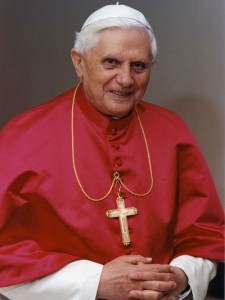
This morning the Holy Father travelled by helicopter from the Apostolic Palace at Castelgandolfo to the Vatican, where he held his weekly general audience in the Paul VI Hall. In his catechesis he dwelt on the first part of Psalm 22, focusing on the theme of prayers of supplication to God.
The Psalm, which remerges in the narrative of Christ’s Passion, presents the figure of an innocent man persecuted and surrounded by adversaries who seek his death. He raises his voice to God “in a doleful lament which, in the certainty of faith, mysteriously gives way to praise”.
The Psalmist’s opening cry of “my God, my God, why have you forsaken me?” is “an appeal addressed to a God Who appears distant, Who does not respond”, said the Holy Father. “God is silent, a silence that rends the Psalmists heart as he continues to cry out incessantly but finds no response”. Nonetheless, he “calls the Lord ‘my’ God, in an extreme act of trust and faith. Despite appearances, the Psalmist cannot believe that his bond with the Lord has been severed entirely”.
The opening lament of Psalm 22 recurs in the Gospels of Matthew and Mark in the cry the dying Jesus makes from the cross. This, Benedict XVI explained, expresses all the desolation the Son of God felt “under the crushing burden of a
mission which had to pass through humiliation and destruction. For this reason He cried out to the Father. … Yet His was not a desperate cry, as the Psalmist’s was”.
Violence dehumanises
Sacred history, the Pope continued, “has been a history of cries for help from the people, and of salvific responses from God”. The Psalmist refers to the faith of his ancestors “who trusted … and were never put to shame”, and he describes his own extreme difficulties in order “to induce the Lord to take pity and intervene, as He always had in the past”.
The Psalmist’s enemies surround him, “they seem invincible, like dangerous ravening beasts. … The images used in the Psalm also serve to underline the fact that when man himself becomes brutal and attacks his fellow man, … he seems to lose all human semblance. Violence always contains some bestial quality, and only the salvific intervention of God can restore man to his humanity”.
At this point, death begins to take hold of the Psalmist. He describes the moment with dramatic images “which we come across again in the narrative of Christ’s Passion: the bodily torment, the unbearable thirst which finds an echo in Jesus’ cry of ‘I am thirsty’, and finally the definitive action of his tormenters who, like the soldiers under the cross, divide among themselves the clothes of the victim, whom they consider to be already dead”.
At this point a new cry emerges, “which rends the heavens because it proclaims a faith, a certainty, that is beyond all doubt. … The Psalm turns into thanksgiving. … The Lord has saved the petitioner and shown him His face of mercy. Death and life came together in an inseparable mystery and life triumphed. … This is the victory of faith, which can transform death into the gift of life, the abyss of suffering into a source of hope”. Thus the Psalm leads us to relive Christ’s Passion and to share the joy of His resurrection.
In closing, the Pope invited the faithful to distinguish deeper reality from outward appearance, even when God is apparently silent. “By placing all our trust and hope in God the Father, we can pray to Him with faith at all moments of anguish, and our cry for help will turn into a hymn of praise”.
AG/ VIS 20110914 (630)
Published by VISarchive 02 – Wednesday, September 14, 2011
Tags: catholic, catholic podcast, catholic prayer, cathollc spirituality, pope benedict xvi, psalm 22
This entry was posted on Wednesday, September 14th, 2011 at 9:34 am
You can follow any responses to this entry through the RSS 2.0 feed.
.
Prayer of Pope Benedict XVI at Ground Zero
“We ask you, in your compassion to bring healing to those who, because of their presence here that day, suffer from injuries and illness. Heal, too, the pain of still-grieving families and all who lost loved ones in this tragedy. Give them strength to continue their lives with courage and hope.
“We are mindful as well of those who suffered death, injury, and loss on the same day at the Pentagon and in Shanksville, Pennsylvania. Our hearts are one with theirs as our prayer embraces their pain and suffering.
“God of peace, bring your peace to our violent world: peace in the hearts of all men and women and peace among the nations of the Earth. Turn to your way of love those whose hearts and minds are consumed with hatred.
“God of understanding, overwhelmed by the magnitude of this tragedy, we seek your light and guidance as we confront such terrible events. Grant that those whose lives were spared may live so that the lives lost here may not have been lost in vain. Comfort and console us, strengthen us in hope, and give us the wisdom and courage to work tirelessly for a world where true peace and love reign among nations and in the hearts of all.” AMEN
Tags: 9-11, catholic, catholic podcast, catholic prayer, cathollc spirituality, ground zero, pope benedict xvi
This entry was posted on Sunday, September 11th, 2011 at 3:59 am
You can follow any responses to this entry through the RSS 2.0 feed.
On Wednesday Pope Benedict XVI challenged the men and women of today’s
world to recover the deepest meaning of art, in its multitude of expressions, but particularly as the path of beauty which leads to God. And in doing so he also shared personal memories of how art had moved him to God with the five thousand pilgrims gathered for the general audience in the tiny village of Castel Gandolfo.
He said “On several occasions during this period, I have recalled the need for every Christian to find time for God, for prayer, amid the many occupations of our daily lives. The Lord Himself gives us many opportunities to remember Him. Today I will touch briefly on one of these channels that can bring us to God and also be of help in encountering Him: it is the path of artistic expression, part of that “path of Beauty “, of which I have spoken several times and which man today should recover in its deepest meaningâ€.
Pope Benedict continued “perhaps sometimes, before a sculpture, a painting, a few verses of a poem or a song, you have experienced deep within an intimate emotion, a sense of joy, that is, you have clearly perceived that in front of you there was not only mere matter, a piece of marble or bronze, a painted canvas, a series of letters or a combination of sounds, but something bigger, something that speaks, capable of touching the heart, of communicating a message; of elevating the soul. ”
“Works of art are the fruit of human creativity, which question the visible reality, trying to discover its deep meaning and to communicate it through the language of shapes, colours, sounds.” The work of art, in short, “is an open door on the infinite,” which “opens the eyes of the mind, of the heart.”
However, he added, “there are artistic expressions that are true paths to God, the supreme Beauty, indeed they help nurture our relationship with Him in prayer. These are works that are born of faith and express faith. One example of this is when we visit a Gothic cathedral; we are enraptured by the vertical lines that shoot up towards the sky and draw our eyes and our spirits upwards, while at the same time, we feel small, and yet eager for fullness … Or when we enter a Romanesque church: we are spontaneously invited to recollection and prayer. We feel as if the faith of generations were enclosed in these splendid buildings. Or, when we hear a piece of sacred music that vibrates the strings of our heart, our soul expands and helped to turn to God. A concert of music by Johann
Sebastian Bach, in Munich, directed by Leonard Bernstein, again comes to my mind. Afterthe last piece of music, one of the Cantate, I felt, not by reasoning, but in my heart, that what I heard had conveyed to me truth, something of the truth of the great composer’s faith and this pressed me to praise and thank the Lord and beside me was the Lutheran Bishop of Munich and spontaneously, feeling this, I said to him, you know, its true, a faith and beauty so strong and irresistibly expresses the presence and truth of God”.
Pope Benedict then turned spoke of how certain artists have touched our lives : “How many times have paintings or frescoes, the fruit of the faith of the artist, in their forms, their colours, their light, encouraged us to direct our thoughts to God and nourished in us the desire to draw from the source of all beauty. What the great artist, Marc Chagall, once
wrote remains true, that for centuries painters have dipped their paintbrush in that coloured alphabet that is the Bible. How many times, then can artistic expressions be occasions to remind us of God, to help our prayer or for the conversion of the heart! Paul Claudel, a poet, playwright, and French diplomat, in the Basilica of Notre Dame in Paris, in 1886, while he was listening to the singing of the Magnificat at Christmas Mass, felt God’s presence. He had not entered the church for reasons of faith, but to in search of arguments against Christians, and instead the grace of God worked in his heart”.
The Holy Father concluded: “I invite you to rediscover the importance of this path for prayer, for our living relationship with God. The cities and towns all over the world preserve works of art that express the faith and remind us of our relationship with God. Visiting places of art, it is not only an occasion for cultural
enrichment, but above all it can be a moment of grace, an encouragement to strengthen our relationship and our dialogue with the Lord, to stop and contemplate, in the transition from simple external reality to a deeper reality, the ray of beauty that strikes us, that almost wounds us in our inner selves and invites us to rise towards God. “
And then he greeted all English speaking pilgrims present: I am pleased to greet the English-speaking pilgrims and visitors here today, especially those from Scotland and Malta. Today we reflect on the need to draw near to God through the experience and appreciation of artistic beauty. Art is capable of making visible our need to go beyond what we see and it reveals our thirst for infinite beauty, for God. Dear friends, I invite you to be open to beauty and to allow it to move you to prayer and praise of the Lord. May Almighty God bless all of you!
Tags: art, catholic, catholic podcast, catholic prayer, cathollc spirituality, music, pope benedict xvi, prayer
This entry was posted on Thursday, September 1st, 2011 at 1:00 am
You can follow any responses to this entry through the RSS 2.0 feed.
Leave it to Vatican Radio to give us a fascinating interview with Fr. Twomey on the orgins and the results of this summer’s “Schuelerkreis”. The “New Evangelization”…what does it really mean?  Believe it or not…in a real way…it’s all about humility (gotta luv it)!
[powerpress]
From Vatican Radio
What does New Evangelisation actually mean? How does the Church – universally and locally – envision its concrete application? Is there any ‘master plan’? And what did they really talk about at the Ratzinger Summer School? These are some of the questions that Emer McCarthy put to Fr. Vincent Twomey SVD., Professor emeritus of Moral Theology at Maynooth seminary in Ireland, and one of the founding members of the Ratzinger Schuelerkreis.
Recently convened for their annual meeting in Castel Gandolfo (Aug. 25-28), the group of 40 former theology and philosophy students of then Professor Joseph Ratzinger were given the task of discussing this sometimes ‘nebulous’ term. Added to their ranks were academics who have chosen to study the thought and writings of Joseph Ratzinger – a suggestion first put forward by Fr. Twomey himself – creating a veritable ‘think-tank’, with some surprising results.
Fr. Twomey speaks of how the concept of New Evangelisation is a thread that runs throughout the teaching and writing of Pope Benedict XVI, then Professor Ratzinger. He brings us back to their first meeting over 40 years ago, when as a young Irish missionary priest, he sought out the ‘promising and brilliant theologian’ in his ‘simple’ Bavarian home to ask to study under him. Fr. Twomey takes us on a journey from the Münster and Tübingen years, through the establishment of Ratzinger’s first ‘Doctoral colloquium’, to the Regensburg years and finally, Rome. He speaks about why the New Evangelisation calls for ‘God’s humility’ and why – contrary to popular belief – secularisation is not wholly negative
Tags: catholic, catholic podcast, catholic prayer, cathollc spirituality, new evangelization, pope benedict xvi
This entry was posted on Tuesday, August 30th, 2011 at 3:30 pm
You can follow any responses to this entry through the RSS 2.0 feed.
August 2011 [powerpress = devotionals-prayers]
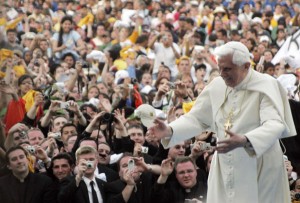 General Intention:Â That the World Youth Day taking place in Madrid may encourage all the young people of the world to root and found their lives in Christ.
General Intention:Â That the World Youth Day taking place in Madrid may encourage all the young people of the world to root and found their lives in Christ.
Missionary Intention:Â That Christians of the West, docile to the action of the Holy Spirit, may re-encounter the freshness and enthusiasm of their faith.
Tags: catholic, catholic podcast, catholic prayer, cathollc spirituality, holy father intentions, pope benedict xvi, prayer
This entry was posted on Tuesday, August 2nd, 2011 at 7:38 am
You can follow any responses to this entry through the RSS 2.0 feed.
JULY 2011 [powerpress = devotionals-prayers]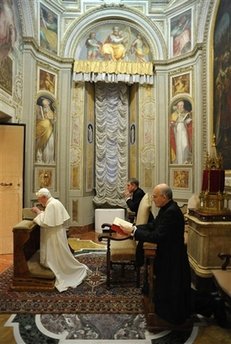
General Intention: That Christians may contribute to alleviating the material and spiritual suffering of AIDS patients, especially in the poorest countries.
Missionary Intention: For the religious who work in mission territories, that they may be witnesses of the joy of the Gospel and living signs of the love of Christ.
Tags: catholic, catholic podcast, catholic prayer, cathollc spirituality, holy father intentions, pope benedict xvi
This entry was posted on Friday, July 1st, 2011 at 2:33 pm
You can follow any responses to this entry through the RSS 2.0 feed.
THE PSALMS: THE BOOK OF PRAYER PAR EXCELLENCE
VATICAN CITY, 22 JUN 2011 (VIS) – Benedict XVI dedicated his catechesis during this morning’s general audience to what he described as “the book of prayer par excellence, the Book of Psalms”. The audience was held in St. Peter’s Square in the presence of 10,000 people.
The 150 Psalms of the Book of Psalms “express all human experience“, said the Pope. “All the truth of the believer comes together in those prayers, which first the People of Israel and later the Church adopted as a special way to mediate their relationship with the one God, and as an adequate response to His having revealed Himself in history“.
“Despite the many forms of expression they contain”, the Psalms “can be divided into two broad categories: … supplication associated with lamentation, and praise. These two dimensions are related, almost indivisible, because supplication is animated by the certainty that God will respond, and this opens the way to praise and thanksgiving; while praise and thanksgiving arise from the experience of salvation received, which presupposes the need for help expressed in the supplication. … Thus, in the prayer of the Psalms, supplication and praise intertwine and fuse together in a single song which celebrates the eternal grace of the Lord as He bows down to our frailty”.
“The Psalms teach us to pray”, the Holy Father explained. “In them, the Word of God becomes the word of prayer. … People who pray the Psalms speak to God with the words of God, addressing Him with the words He Himself taught us. … Through these words it is also possible to know and accept the criteria of His actions, to approach the mystery of His thoughts and His ways, so as to grow and develop in faith and love”.
“By teaching us to pray”, the Pope went on, “the Psalms also teach us that at times of desolation, even
in moments of suffering, the presence of God is a source of wonder and consolation. We may weep, plead and seek intercession, … but in the awareness that we are advancing towards the light, where praise will be unending”.
“Equally important and significant are the manner and frequency in which the words of the Psalms appear in the New Testament, where they assume and underline that prophetic significance suggested by the link of the Book of Psalms with the messianic figure of David. In His earthly life the Lord Jesus prayed with the Psalms, and in Him they reach definitive fulfilment and reveal their fullest and deepest meaning. The prayers of the Book of Psalms, with which we speak to God, speak to us of Him, they speak of the Son, image of the invisible God Who fully reveals the Father’s face to us.
Thus Christians, by praying the Psalms, pray to the Father in Christ and with Christ, seeing those songs in a new perspective which has its ultimate interpretation in the Paschal Mystery”.
Having completed his catechesis and delivered greetings in various languages, the Pope recalled the fact that tomorrow is the Feast of Corpus Christi. He invited everyone in Rome, residents and pilgrims alike, to participate in the Mass he will celebrate at 7 p.m. tomorrow in the basilica of St. John Lateran, and in the subsequent procession along Via Merulana to the basilica of St. Mary Major. “I invite you”, he said, “to join this act of profound faith towards the Eucharist, which represents the most precious treasure of the Church and of humankind”.
AG/Â Â Â Â Â Â Â Â Â Â Â Â Â Â Â Â Â Â Â Â Â Â Â Â Â Â Â VIS 20110622 (590)
For the Psalms On-Line
The more extensive translation:
ZE11062202 – 2011-06-22
Permalink: http://www.zenit.org/article-32912?l=english
ON LEARNING TO PRAY WITH THE PSALMS
Addressing Him “With the Words That He Himself Gives Us”
VATICAN CITY, JUNE 22, 2011 (Zenit.org).- Here is a translation of the Italian-language catechesis Benedict XVI gave today during the general audience held in St. Peter’s Square. The Pope continued with his series of catecheses on prayer, turning today to a consideration of the Book of Psalms.
* * *
Dear brothers and sisters,
In the preceding catecheses, we paused to consider a number of Old Testament figures who are particularly significant for our reflection on prayer. I spoke about Abraham, who intercedes for the foreign cities; about Jacob, who in his nighttime combat receives a blessing; about Moses, who begs for forgiveness for his people; and about Elijah, who prays for the conversion of Israel. With today’s catechesis, I would like to begin down a new path: Rather than commenting on particular accounts of persons at prayer, we will enter into the “prayerbook” par excellence, the Book of Psalms. In the upcoming catecheses we will read and meditate on a number of the most beautiful psalms which are also dearest to the Church’s tradition of prayer. Today I would like to introduce them by speaking about the Book of Psalms as a whole.
The Psalter presents itself as a “formulary” of prayers, a collection of 150 psalms that the biblical tradition gives to the people of believers in order that they may become their — our prayer — our way of addressing God and of relating to Him. In this book, the whole of human experience with its many facets finds expression, along with the entire range of emotions that accompany man’s existence. In the Psalms, joy and suffering, desire for God and the perception of one’s own unworthiness, delight and the sense of abandonment, trust in God and painful solitude, fullness of life and fear of death are all interwoven and expressed. The believer’s whole reality flows into these prayers, which first the people of Israel and then the Church took up as a privileged meditation on the relationship with the one God, and the fitting response to His self-revelation in history.
As prayer, the Psalms are manifestations of the soul and of faith, in which everyone can recognize himself and in which there is communicated that experience of special closeness to God, to which each man is called. And it is the whole complexity of human existence that converges in the complexity of the different literary forms of the various psalms: hymns, lamentations, individual and collective supplication, songs of thanksgiving, penitential psalms, and other genre that are found in these poetic compositions.
Despite this wide range of expression, two great areas can be identified that synthesize the prayer of the Psalter: petition, which is connected with lament, and praise — two interconnected and almost inseparable dimensions. For petition is animated by the certainty that God will respond, and this opens up to praise and thanksgiving; and praise and thanksgiving flow from the experience of salvation received, which assumes the need for the help expressed by the petition.
In petition, the one who prays laments and describes his situation of distress, of danger, of desolation; or, as in the penitential psalms, he confesses guilt and sin, and asks to be forgiven. He lays bare his neediness before the Lord, in the confidence of being heard, and this implies an acknowledgement of God as good, as desirous of the good, and as the “lover of life” (cf. Wisdom 11:26) who is ready to help, save and forgive. Thus, for example, the Psalmist in Psalm 31 prays: “In thee, O Lord, do I seek refuge; let me never be put to shame [ … ] take me out of the net which is hidden for me, for thou art my refuge (verses 2,5 [1,4]). Therefore, already in the lament something of praise may emerge, announcing itself in the hope of divine intervention, and becoming explicit once divine salvation has become a reality.
In an analogous way — in the psalms of thanksgiving and of praise — in remembering the gift received or in contemplating the greatness of God’s mercy, one recognizes one’s own littleness as well as one’s need for salvation, which is at the foundation of petition. In this way, one confesses to God one’s own condition as a creature, inevitably marked as it is by death, and yet the bearer of a radical desire for life. For this reason, in Psalm 86 the Psalmist exclaims: “I give thanks to thee, o Lord my God, with my whole heart, and I will glorify thy name forever. For great is thy steadfast love toward me; thou hast delivered my soul from the depths of Sheol” (verses 12, 13). In this way, in the prayer of the Psalms, petition and praise are interwoven and blend together into one unique song that celebrates the Lord’s eternal grace that bends down to our frailty.The book of the Psalter was given to Israel and to the Church precisely in order that the people of believers might be permitted to unite themselves to this song. The Psalms, in fact, teach us to pray. In them, the Word of God becomes the word of prayer — and they are the Psalmists’ inspired words — which also become the word of the one who prays the Psalms. This is the beauty and the special nature of this biblical book: Unlike other prayers we find in sacred Scripture, the prayers contained [in the Book of Psalms] are not inserted into a narrative story which specifies either their meaning or their function. The Psalms are given to the believer precisely as a text of prayer, which has as its one end that of becoming the prayer of the one who takes them up and, with them, addresses himself to God. Since they are the Word of God, he who prays the Psalms speaks to God with the very words that God has given to us; he addresses Him with the words that He Himself gives us. Thus, in praying the Psalms we learn to pray. They are a school of prayer.
Something analogous happens when a child begins to talk; when he learns, that is, to express his feelings, emotions, and needs with words that do not belong to him naturally, but which he learns from his parents and from those who live around him. What the child wants to express is his own personal experience, but the means of expression belong to others; and little by little he appropriates them — the words received from his parents become his words, and through those words he also learns a way of thinking and feeling; he enters into a whole world of concepts, and in this [world] he grows, relates with reality, with men and with God. At last, the language of his parents becomes his language; he speaks with the words received from others, which by now have become his words.
And so it is with the prayer of the Psalms. They are given to us so that we might learn to address ourselves to God, to communicate with Him, to talk to Him about ourselves with His words, to find language for an encounter with Him. And, through those words, it will also be possible to know and to receive the standards of his way of acting, to approach the mystery of his thoughts and of his ways (cf. Isaiah 55:8-9), so as to grow always more in faith and love. As our words are not only words, but also teach us about a real and conceptual world, so also these prayers teach us about the heart of God, for which reason are we able not only to speak with God, but also to learn who God is and — in learning how to speak with Him — we learn what is it to be man, to be ourselves.
In this regard, the title given to the Psaltery by the Jewish tradition appears significant. It is called Tehellim, an Hebraic term that means “songs of praise,” [which comes] from the root word we find in the expression “Halleluiah” — literally: “praise the Lord.” Thus, even though this prayerbook is so multifaceted and complex — with its various literary genre and with its connection between praise and petition – it is ultimately a book of praise, that teaches us to give thanks, to celebrate the greatness of the gift of God, to acknowledge the beauty of His words and to glorify His holy Name.
This is the most fitting response before God’s self-revelation, and the experience of His goodness. By teaching us to pray, the Psalms teach us that, even in the midst of desolation, in suffering, God’s presence remains and is the source of wonder and of consolation; we can cry, beg, intercede, lament, but [we do so] in the knowledge that we are walking toward the light, where praise can be definitive; “in thy light do we see light” (Psalm 36:10 [9]).
But beyond the book’s general title, the Jewish tradition has also given specific titles to many of the psalms, attributing them in great part to King David. A figure of notable human and theological depth, David is a complex personality who passed through the most varied experiences fundamental to life. A young shepherd of his father’s flock — passing through the ups and downs and at times dramatic events of life — he becomes king of Israel, the shepherd of God’s people. Although a man of peace, he fought many wars; an untiring and tenacious seeker of God, yet he betrayed His love, and this is characteristic: He always remained a seeker of God, even though he sinned gravely many times; a humble penitent, he received divine forgiveness, even divine pity, and he accepted a fate marked by suffering. Thus, in all his weakness, David was a king “after God’s own heart” (cf. 1 Samuel 13:14); that is, a passionate man of prayer, a man who knew what it meant to petition and to praise. The connection of the Psalms with this illustrious king of Israel is important, then, for he is a messianic figure, the Lord’s Anointed, in whom the mystery of Christ is in some way foreshadowed.Just as important and meaningful are the ways and frequency with which the words of the psalms are repeated in the New Testament, taking up and underscoring the prophetic value suggested by the Psalter’s connection with the messianic figure of David. In the Lord Jesus, who during His earthly life prayed with the Psalms, they find their definitive fulfillment and reveal their fullest and most profound meaning. The prayers of the Psalter, with which we speak to God, speak to us of Him, they speak to us of the Son, the image of the invisible God (Colossians 1:15), who fully reveals to us the Face of the Father. The Christian, therefore, in praying the Psalms, prays to the Father in Christ and with Christ, taking up those songs within a new perspective, which finds its ultimate interpretative key in the Paschal mystery. Thus do the horizons of the one who prays open up to unexpected realities — each Psalm acquires a new light in Christ and the Psalter is able to shine in all its infinite richness.
Dearest brothers and sisters, let us take this holy book in hand; let us allow ourselves to be taught by God to address ourselves to Him; let us make the Psalter a guide that helps us and accompanies us daily along the way of prayer. And let us, like Jesus’ disciples, also ask: “Lord, teach us to pray” (Luke 11:1), opening our hearts to receive the Teacher’s prayer, in which all prayers attain their fulfillment. Thus, made sons in the Son, will we be able to speak to God calling Him “Our Father.” Thank you.
[Translation by Diane Montagna]
Tags: catholic, catholic podcast, catholic prayer, cathollc spirituality, pope benedict xvi, prayer, psalms
This entry was posted on Wednesday, June 22nd, 2011 at 9:23 am
You can follow any responses to this entry through the RSS 2.0 feed.
T
THE POWER OF INTERCESSION: THE PROPHET ELIJAH’S PRAYER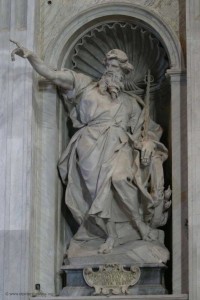
VATICAN CITY, 15 JUN 2011 (VIS) – In his general audience, held this morning in St. Peter’s Square, the Pope resumed his series of catecheses dedicated to the subject of prayer, focusing today on the Prophet Elijah “whom God sent to bring the people to conversion”.
The Holy Father explained how “upon Mount Carmel Elijah revealed himself in all his power as intercessor when, before the whole of Israel, he prayed to the Lord to show Himself and convert people’s hearts. The episode is recounted in chapter 18 of the First Book of Kings”.
“The contest between Elijah and the followers of Baal (which was, in fact, a contest between the Lord of Israel, God of salvation and life, and a mute and ineffective idol which can do nothing for either good or evil) also marked the beginning of a confrontation between two completely different ways to address God and to pray”. The oblations of the prophets of Baal “revealed only the illusory reality of the idol … which closed people in the confines of a desperate search for self”.
On the other hand, Elijah “called on the people to come closer, involving them in his actions and his prayer. … The prophet built an alter using ‘twelve stones, according to the number of the tribes of the sons of Jacob’, … to represent all Israel. … Elijah then addressed the Lord calling Him Lord of the fathers, thus implicitly recalling the divine promises and the history of choice and alliance which had indissolubly united the Lord to His people”.
 The prophet’s request “was that the people might finally and fully come to know and understand Who their God is, and make the decisive decision to follow only Him. Only in this way could God be recognised as Absolute and Transcendent”. Only in this way would it be clear that “no other gods could be placed at His side, as this would deny His absoluteness and relativize Him”.
The prophet’s request “was that the people might finally and fully come to know and understand Who their God is, and make the decisive decision to follow only Him. Only in this way could God be recognised as Absolute and Transcendent”. Only in this way would it be clear that “no other gods could be placed at His side, as this would deny His absoluteness and relativize Him”.
Benedict XVI highlighted how
“believers must respond to the absoluteness of God with absolute and total love, a love involving all their lives, their energies, their hearts. … In his intercession, Elijah asked of God what God Himself wished to do: to show Himself in all His mercy, faithful to His nature as Lord of life Who forgives, converts and transforms”.
“The Lord responded unequivocally, not only burning the offering but even consuming all the water that had been poured around the altar. Israel could no longer doubt: divine mercy had responded to its weakness, to its doubts, to its lack of faith. Now Baal, the vain idol, was beaten and the people, who seemed lost, had rediscovered the way of truth, they had rediscovered themselves“.
The Holy Father concluded by asking himself what this story has to tell us today.
“Firstly”, he said, “is the priority of the first commandment of God’s Law: having no god but God. When God disappears man falls into slavery, into idolatry, as has happened in our time under totalitarian regimes and with the various forms of nihilism which make man dependent on idols and idolatry, which enslave”. Secondly, he continued, “the main objective of prayer is conversion: the fire of God which transforms our hearts and makes us capable of seeing God and living for Him and for others”. Thirdly, “the Church Fathers tell us that this story is … a foretaste of the future, which is Christ. It is a step on the journey towards Christ”.
AG/ VIS 20110615 (590)
Published by VIS – Holy See Press Office – Wednesday, June 15, 2011
Tags: catholic, catholic podcast, catholic prayer, cathollc spirituality, elijah, intercession, pope benedict xvi, prayer
This entry was posted on Wednesday, June 15th, 2011 at 9:10 am
You can follow any responses to this entry through the RSS 2.0 feed.
[powerpress = “vatican-radio”]
EVANGELISATION IS A TASK FOR ALL MEMBERS OF THE CHURCH
VATICAN CITY, 14 JUN 2011 (VIS) – Yesterday at 7.30 p.m. in the Roman basilica of St. John Lateran Benedict XVI inaugurated an ecclesial congress marking the close of the pastoral year of the diocese of Rome. The congress, which will run from 13 to 15 June, has as its theme: “The joy of engendering the faith in the Church of Rome”.
Commenting on the choice of theme, the Pope affirmed that “the faith cannot endure by itself in the world, it is not automatically transmitted to men’s hearts but always has to be announced. And the announcement of the faith, in order to be effective, must come from a heart that believes, that hopes, that loves, a heart that adores Christ and believes in the power of the Holy Spirit. … The response of faith arises when, by God’s grace, man discovers that believing means finding true life, the ‘full life'”.
The Holy Father highlighted the fact that
“the Church, each one of us, must bring the world the good news that Jesus is Lord, the One in Whom God’s closeness and love for each man and woman became flesh. This announcement must resound anew in regions of ancient Christian tradition”. In this context the Pope recalled words he had pronounced at World Youth Day 2005 in Cologne, Germany: “The happiness you seek, the happiness you have the right to enjoy, has a name and a face: Jesus of Nazareth, concealed in the Eucharist.
“If mankind forgets God”, he added, “this is also because Jesus is often reduced to the status of a wise man, and His divinity is diminished if not denied outright. This way of thinking makes it impossible to comprehend the radical novelty of Christianity, because if Jesus is not the only Son of the Father, then God did not enter into the history of mankind. The truth is that the incarnation is at the very heart of the Gospel. May we, then, show increasing commitment to renewing evangelisation, which is a task not just for the few but for all the members of the Church“.
“Should we too not share the beauty and reason of the faith, and carry the light of God to the men and women of our time with courage, conviction and joy?” Pope Benedict asked. “Many are the people who have not yet met the Lord; they must be given our special pastoral attention. … Today this is more urgent than ever and requires us to commit ourselves trustingly, upheld by the certainty that the grace of God always works on the heart of man”.
Tags: catholic, catholic podcast, catholic prayer, cathollc spirituality, discerning heart, new evangelization, pope benedict xvi, vatican radio
This entry was posted on Wednesday, June 15th, 2011 at 5:10 am
You can follow any responses to this entry through the RSS 2.0 feed.
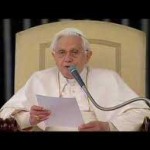 VATICAN CITY, 1 JUN 2011 (VIS) – Benedict XVI dedicated today’s general Wednesday audience catechesis to the figure of Moses who “carried out his function as mediator between God and Israel, making himself the bearer of the divine words and commands for his people, bringing them to the freedom of the Promised Land … and, above all, praying”.
VATICAN CITY, 1 JUN 2011 (VIS) – Benedict XVI dedicated today’s general Wednesday audience catechesis to the figure of Moses who “carried out his function as mediator between God and Israel, making himself the bearer of the divine words and commands for his people, bringing them to the freedom of the Promised Land … and, above all, praying”.
The Pope emphasized that Moses especially acts as intercessor when the people ask Aaron to build the golden calf while they are waiting for the prophet who has ascended Mount Sinai to receive the Tables of the Law. “Tired of following a path with a God who is invisible now that Moses the mediator has also gone, the people demand a tangible, palpable presence of the Lord and find an accessible god, within the reach of human beings, in Aaron’s molten metal calf. This is a constant temptation on the path of faith: avoiding the divine mystery by building a comprehensible god that corresponds to our own preconceptions and plans”.
human beings, in Aaron’s molten metal calf. This is a constant temptation on the path of faith: avoiding the divine mystery by building a comprehensible god that corresponds to our own preconceptions and plans”.
In the face of the Israelites’ infidelity, God asks Moses to let him destroy that rebel people but Moses understands that those words are directed at him so that the prophet “might intervene and ask him not to do it. … If God were to let his people perish, it could be interpreted as a sign of divine incapacity to fulfill the plan of salvation and God could not allow that: He is the good Lord who salves, the guarantor of life, the God of mercy and forgiveness, of liberation from sin that kills. … Moses had a concrete experience of the God of salvation. He was sent as the mediator of divine liberation and now, with his prayer, he becomes the interpreter of a dual concern, worried for the fate of his people but also worried for the honor due the Lord by the truth of his name. … The love for his brothers and sisters and the love of God are united in his prayer of intercession and are inseparable. Moses, the intercessor, is the man between two loves that, in prayer, are superimpose in one single desire for good”.
 “The intercessor does not make excuses for the sin of his people and does not list the presumed merits of either himself or his people. He appeals to God’s generosity: a free God, completely love, who never ceases to seek those who have drawn away from him. … Moses asks God to show himself even stronger than sin and death and, with his prayer, brings about this divine revelation”.
“The intercessor does not make excuses for the sin of his people and does not list the presumed merits of either himself or his people. He appeals to God’s generosity: a free God, completely love, who never ceases to seek those who have drawn away from him. … Moses asks God to show himself even stronger than sin and death and, with his prayer, brings about this divine revelation”.
“In Moses who is at the top of the mountain – face to face with God, the intercessor of his people – the Fathers of the Church have seen a prefiguration of Christ who, atop the Cross, is truly before God, not just as friend but as Son. … His intercession”, the pontiff concluded, “is not just solidarity but identification with us. … He gives us a forgiveness that transforms and renews. I believe we must meditate on this reality: Christ before God praying for us, identifying with us. From the heights of the Cross he didn’t bring us new stone tablets of the law but himself as Covenant”.
AG/Â Â Â Â Â Â Â Â Â Â Â Â Â Â Â Â Â Â Â Â Â Â Â Â Â Â Â VIS 20110601 (530)
UPDATED – complete text in English from Vatican.va
BENEDICT XVI
GENERAL AUDIENCE
St. Peter’s Square
Wednesday, 1 June 2011
[Video]
Dear Brothers and Sisters,
As we read the Old Testament we note one figure who stands out from among the others: Moses, precisely, as a man of prayer. Moses, the great prophet and leader at the time of the Exodus, carried out his role as mediator between God and Israel by making himself a messenger to the people of God’s words and divine commands, by leading it towards the freedom of the Promised Land and by teaching the Israelites to live obeying God and trusting in him during their long sojourn in the desert. However, I would say also, and above all, by praying.
Moses prayed for the Pharaoh when God, with the plagues, was endeavouring to convert the Egyptians’ hearts (cf. Ex 8-10); Moses asked the Lord to heal his sister Miriam, afflicted with leprosy (cf. Num 12:9-13); he interceded for the people which had rebelled fearful of what those who had spied out the land would report (cf. Num 14:1-19); he prayed when fire was about to burn down the camp (cf. Num 11:1-2), and when poisonous serpents decimated the people (cf. Num 21:4-9); he addressed the Lord and reacted by protesting when the burden of his mission became too heavy (cf. Num 11:10-15); he saw God and spoke “to him face to face, as a man speaks to his friend†(cf. Ex 24:9-17; 7-23; 34:1-10, 28-35).
And on Sinai, even while the people were asking Aaron to make a golden calf, Moses prayed, explaining with symbols his own role as intercessor. The episode is recounted in chapter 32 of the Book of Exodus and there is a parallel account in chapter 9 of Deuteronomy.
It is this episode on which I would like to reflect in today’s Catechesis and, in particular, on Moses’ prayer which we find in the Exodus narrative. The people of Israel were at the foot of Sinai whereas Moses, on the mountain, was waiting for the gift of the Tables of the Law, fasting for 40 days and 40 nights (cf. Ex 24:18; Dt 9:9). The number 40 has a symbolic value and suggests the totality of the experience, whereas fasting indicates that life comes from God, that it is he who sustains it.
Indeed, the act of eating entails the assumption of the nourishment that keeps us going; hence fasting, giving up all food, in this case acquires a religious significance: it is a way of showing that man does not live by bread alone but by every word that comes from the mouth of the Lord (cf. Deut 8:3). By fasting Moses showed that he was awaiting the gift of the divine Law as a source of life: this Law reveals God’s will and nourishes the human heart, bringing men and women to enter into a covenant with the Most High, who is the source of life, who is life itself.
Yet, while the Lord, on the mountain, was giving the Law to Moses, at the bottom of the mountain the people were violating it. Unable to endure waiting and the absence of their mediator, the Israelites turned to Aaron: “make us gods, who shall go before us; as for this Moses, the man who brought us up out of the land of Egypt, we do not know what has become of him†(Ex 32:11). Weary of the journey with an invisible God, now that Moses, their mediator, had disappeared, the people clamoured for an actual, tangible presence of the Lord, and in the calf of molten metal made by Aaron found a god made accessible, manageable and within human reach.
This is a constant temptation on the journey of faith: to avoid the divine mystery by constructing a comprehensible god who corresponds with one’s own plans, one’s own projects.
What happened on Sinai shows the sheer folly and deceptive vanity of this claim because, as Psalm 106[105] ironically affirms: “they exchanged the glory of God for the image of an ox that eats grass†(v. 20). So it was that the Lord reacted and ordered Moses to come down from the mountain, revealing to him what the people were doing and ending with these words: “now therefore let me alone, that my wrath may burn hot against them and I may consume them; but of you I will make a great nation†(Ex 32:10).
As he had to Abraham with regard to Sodom and Gomorrah, now too God revealed to Moses what his intentions were, almost as though he did not want to act without Moses’ consent (Am 3:7).
He said: “let… my wrath … burn hotâ€. In fact these words “let… my wrath burn hot†were spoken so that Moses might intervene and ask God not to do it, thereby revealing that what God always wants is salvation.
Just as for the two cities in Abraham’s day, the punishment and destruction — in which God’s anger is expressed as the rejection of evil — demonstrate the gravity of the sin committed; at the same time, the request of the intercessor is intended to show the Lord’s desire for forgiveness. This is God’s salvation which involves mercy, but at the same time also the denunciation of the truth of the sin, of the evil that exists, so that the sinner, having recognized and rejected his sin, may let God forgive and transform him. In this way prayers of intercession make active in the corrupt reality of sinful man divine mercy which finds a voice in the entreaty of the person praying and is made present through him wherever there is a need for salvation.
Moses’ supplication was wholly based on the Lord’s fidelity and grace. He referred first to the history of redemption which God began by bringing Israel out of Egypt and then recalled the ancient promise made to the Fathers. The Lord brought about salvation by freeing his people from slavery in Egypt; so “whyâ€, Moses asked, “should the Egyptians say, ‘With evil intent did he bring them forth, to slay them in the mountains, and to consume them from the face of the earth?’†(Ex 32:12).
Once the work of salvation has been begun it must be brought to completion; were God to let his people perish, this might be interpreted as a sign of God’s inability to bring the project of salvation to completion. God cannot allow this: he is the good Lord who saves, the guarantor of life, he is the God of mercy and forgiveness, of deliverance from sin that kills.
Hence Moses appealed to God, to the interior life of God against the exterior judgement. But, Moses then argued with the Lord, were his Chosen People to perish, even though guilty, God might appear incapable of overcoming sin. And this he could not accept.
Moses had a concrete experience of the God of salvation; he was sent as a mediator of divine liberation and then, with his prayers; he made himself the interpreter of a twofold anxiety; he was worried about his people’s future and at the same time he was also worried about the honour due to the Lord, about the truth of his name. In fact the intercessor wanted the People of Israel to be saved because this people was the flock which had been entrusted to him, but also because it was in this salvation that the true reality of God was manifest.
The prayer of intercession is permeated by love of the brethren and love of God, they are inseparable. Moses, the intercessor, is the man torn between two loves that overlap in prayer in a single desire for good.
Moses then appealed to God’s faithfulness, reminding him of his promises: “Remember Abraham, Isaac, and Israel, your servants, to whom you swore by your own self, and said… ‘I will multiply your descendants as the stars of heaven, and all this land [of which I have spoken] I will give to your descendants, and they shall inherit it for ever†(Ex 32:13). Moses recalls the founding story of the origins, of the Fathers of the people and of their being totally freely chosen, a choice in which God alone took the initiative. Not for their own merits did they receive the promise, but because of God’s free choice and his love (cf. Deut 10:15).
And Moses then asked the Lord to continue in fidelity his record of choosing and salvation, by forgiving his people. The intercessor did not ask for his people to be excused of their sin, he did not list any presumed merits, either the people’s or his own, but appealed to God’s bounty: a free God, total love, who does not cease to seek out those who have fallen away, who is always faithful to himself, who offers the sinner a chance to return to him and, through forgiveness, to become righteous and capable of fidelity. Moses asked God to show himself more powerful than sin and death, and with his prayer elicited this divine revelation of himself.
As a mediator of life, the intercessor showed solidarity with the people: anxious solely for the salvation that God himself desires, he gave up the prospect of it becoming a new people pleasing to the Lord. The sentence that God had addressed to him, “of you I will make a great nationâ€, was not even taken into consideration by the “friend†of God, who, instead, was ready to take upon himself not only the guilt of his people, but also all its consequences.
When, after the destruction of the golden calf, he returned to the mountain to ask salvation for Israel once again, he was to say to the Lord: “But now, if you will, forgive their sin — and if not, blot me, I pray you, out of your book which you have written†(Ex 32:32).
With prayer, wanting what God wanted, the intercessor entered more and more deeply into knowledge of the Lord and of his mercy, and became capable of a love that extended even to the total gift of himself. In Moses, on the summit of the mountain face to face with God, who made himself an intercessor for his people and offered himself — “blot me out†— the Fathers of the Church saw a prefiguration of Christ who from the very top of the Cross was truly before God, not only as a friend but as Son. And not only did he offer himself — “blot me out†— but with his pierced heart he had himself blotted out, he himself became sin, as St Paul himself says, he tookupon himself our sins to ensure our salvation. His intercession was not only solidarity but identification with us: he bears all of us in his Body. And thus his whole life as a man and as Son is a cry to God’s heart, it is forgiveness, but forgiveness that transforms and renews.
I think we should meditate upon this reality. Christ stands before God and is praying for me. His prayer on the Cross is contemporary with all human beings, contemporary with me. He prays for me, he suffered and suffers for me, he identified himself with me, taking our body and the human soul. And he asks us to enter this identity of his, making ourselves one body, one spirit with him because from the summit of the Cross he brought not new laws, tablets of stone, but himself, his Body and his Blood, as the New Covenant. Thus he brings us kinship with him, he makes us one body with him, identifies us with him. He invites us to enter into this identification, to be united with him in our wish to be one body, one spirit with him. Let us pray the Lord that this identification may transform and renew us, because forgiveness is renewal and transformation.
I would like to end this Catechesis with the Apostle Paul’s words to the Christians of Rome: “Who shall bring any charge against God’s elect? It is God who justifies; who is to condemn? It is Christ Jesus, who died, yes, who was raised from the dead, who is at the right hand of God, who indeed intercedes for us. Who shall separate us from the love of Christ?… neither death, nor life, nor angels, nor principalities… nor anything else in all creation, will be able to separate us from the love of God, [which is] in Christ Jesus our Lord†(Rom 8:33-35, 38, 39).
Tags: catholic, catholic podcast, catholic prayer, cathollc spirituality, pope benedict xvi, prayer
This entry was posted on Thursday, June 2nd, 2011 at 9:04 am
You can follow any responses to this entry through the RSS 2.0 feed.
[powerpress feed = “devotionals-prayers”]
JUNE 2011
General Intention: That priests, united to the Heart of Christ, may always be true witnesses of the caring and merciful love of God.
Missionary Intention: That the Holy Spirit may bring forth from our communities numerous missionary vocations, willing to fully consecrate themselves to spreading the Kingdom of God.
Tags: catholic, catholic podcast, catholic prayer, cathollc spirituality, pope benedict xvi, prayer
This entry was posted on Wednesday, June 1st, 2011 at 12:03 am
You can follow any responses to this entry through the RSS 2.0 feed.

